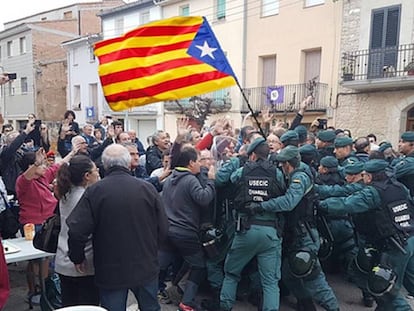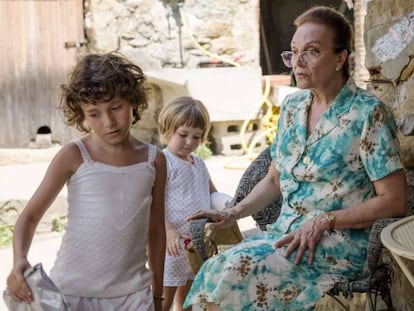Catalonia: The gravity of the situation
The pro-independence movement has waged a war against the free press
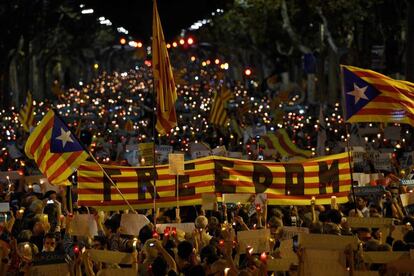
A century ago now, an American senator stated that ¡°the first victim of war is the truth.¡± This statement holds true for political and ideological wars, especially in this era where politicians have decided that it is in their interest to harass the media so as not to have to submit to the rigors of fact-checking. The current crisis in Catalonia is no exception. Under a mountain of lies, exaggerations, unfounded rumors and post-truths, there are a series of facts that we the media have the obligation to preserve and transmit, despite a toxic atmosphere that is putting our very existence at risk.
Let¡¯s consider the facts behind two pro-independence leaders ending up in pre-trial custody without bail. Just the facts, chronologically: On September 20, the Spanish National Police and Civil Guard carried out searches and arrests to stop a referendum from going ahead in Catalonia, after the poll was declared illegal by the Spanish courts. The two major private associations that work in favor of secession from Spain, the National Catalan Assembly (ANC, with 80,000 members), and ?mnium Cultural (with 73,000 members), called for protests where Spanish officers were working.
One of those areas was the headquarters of the regional economy department in Barcelona. The Civil Guard officers entered at 8am and left three patrol cars ¨C with weapons and ammunition inside ¨C outside the front entrance. While the police were carrying out the work that had been ordered by a judge, around 40,000 people gathered outside the doors and blocked off the exit. The officers were trapped inside until after 2am, and the last to leave did so 24 hours after having entered.
Outside, the crowds broke the cars¡¯ windows, burst their tires and stole the material. A number of protestors got up on the hoods of the cars. During the night, the two leaders of ANC and ?mnium Cultural, Jordi S¨¤nchez and Jordi Cuixart, also got up on the hoods of the cars, with a megaphone. The only video that has circulated of that incident is one of Cuixart saying to the demonstrators on top of the destroyed car: ¡°We call on you, as far as is possible, for this protest to disperse.¡±
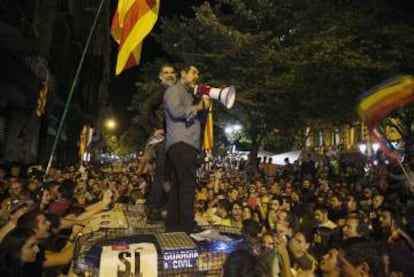
For the High Court judge in charge of the probe into the day¡¯s events, these facts are sufficient to accept the charges of sedition against the two pro-independence leaders, given that she believes that there is proof that they tried to encourage the masses to impede the actions of the justice system.
Under Spanish law, the offense of sedition carries a maximum 15-year prison sentence for those who ¡°publicly and tumultuously rise up to prevent, by force or outside the legal channels, application of the law, or any authority, official corporation or public officer from the lawful exercise of their duties, or implementation of administrative or judicial resolutions.¡±
The pair¡¯s trial has yet to start, but the judge in charge of the investigative stage believes that there is a flight risk in the case of the two suspects, or that they will not appear in court.
These are the facts ¨C facts on which there are a huge amount of opinions. One could think, as the pro-independence supporters do, that the referendum was legitimate and the two activists are unfairly jailed defenders of democracy. One could also think the opposite: that not only do they deserve to be held in pre-trial custody without bail, but also deserve a conviction for having facilitated a situation that saw Civil Guard officers effectively held hostage until the early hours of the morning.
These, however, are only opinions. The media should report on facts. We cannot adapt our news stories to a political or ideological narrative, no matter how honorable their aims may be. And that is the part of the press. Then there is the part about Spain as a whole.
Spain is a country with the rule of law, and with a democratic system as young as it is complex. Of course, it is not a perfect democracy, if such a thing even exists. Spain has some serious problems: high levels of unemployment, corruption within the party that is in government, inequality between its different regions, and high abstention in election processes. Even so, since 2006 it has scored 9/10 in The Economist magazine¡¯s Democracy Index, above the United States, France and Italy. Spain also has high benchmarks of pluralism and civil liberties.
In its 40 years of democracy, Spain has managed a complex balance: it is not a centralist state such as France, but neither is it completely federal, such as Germany. It¡¯s a hybrid, in which there are regions with less autonomy and others with a level of self-governance on a par with that of Switzerland, as is the case of Catalonia. This is also a fact: the Catalans have their own health system, education system and police force, among many other powers.
In terms of rights, Spain does not have death penalty, there is a public, universal healthcare system and elections are regularly called on the local, regional and national levels. And above all else, there is freedom of expression and information. After so many years of dictatorship, the press is finally able to operate as Thomas Carlyle defined it in the 19th century: as a fourth estate, one that monitors the other three: the executive, the legislative and the judicial powers.
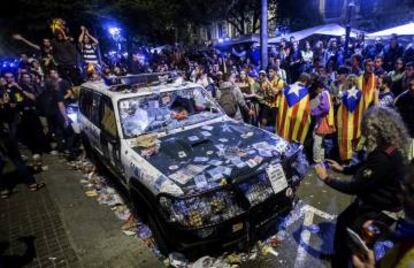
What is genuinely worrying is that this freedom of the press is in danger due to the Catalan crisis. The starting gun for the persecution that journalists are being subjected to was fired in August, when the Catalan regional premier, Carles Puigdemont, said that an editorial from EL PA?S was ¡°miserable¡± for calling for the independence process to be halted given the severity of the terrorist attacks in Barcelona.
Journalists from EL PA?S are being called fascists, nazis and murderers. We are being harassed on social networks with insults directed at us and our families. Anonymous profiles post messages saying that they know where we live. Those of us who appear on television have been shouted at and insulted on the street. The atmosphere is stifling, above all in Catalonia. Using activists on Twitter, with Julian Assange taking the lead, and media outlets that are highly subsidized by the Catalan government ¨C such as El Nacional ¨C pro-independence forces have put a tremendous campaign into action in a bid to silence us or adapt our reporting to their narrative.
Even Reporters Without Borders (RWB) has got involved: ¡°Driven by the intimidation maneuvers of the executive of Mariano Rajoy, the regional government has gone too far in its attempts to impose its vision on local, Spanish and international media,¡± the head of the RWB office for the EU-Balkans, Pauline Ad¨¨s-Mevel, has said. RWB has compared these tactics with the ¡°campaigns of Donald Trump and far-right movements,¡± and they are.
When pro-independence supporters hurl insults at veteran journalists who risked their lives to do their jobs during a dictatorship, and call them fascists, they are acting like Trump, who qualifies every story that he doesn¡¯t like as being ¡°fake news.¡±
Separatist politicians have begun treating the press as their worst enemy,?making the entire construct of Spanish democracy tremble.?They are seeking any kind of suspicious insinuation among the owners and stakeholders of media companies. In the case of EL PA?S, which is fully and only owned by Grupo PRISA, they have even suggested absurd and ill-intentioned relations such as being behind funding for so-called Islamic State. Anything goes for these politicians and activists, in order to destroy the media and do away with any story that does not bend to their will.
Another of the strategies they follow is to say that this newspaper is acting under the orders of the central government during this Catalan crisis. And that is a serious affront, because the independence of this newspaper and its professionals are completely protected from any interference from the powers-that-be by a charter that is an example among the European press. In its editorials, EL PA?S has been ¨C and continues to be ¨C incredibly tough and critical of the Popular Party government: for not having engaged in politics when it had the chance, for having been irresponsible and indolent with this crisis, for not having spearheaded reforms to the Constitution to grant Catalonia greater autonomy. In fact, it went so far as to support the alternative that was led by the Socialist Party at the last elections.
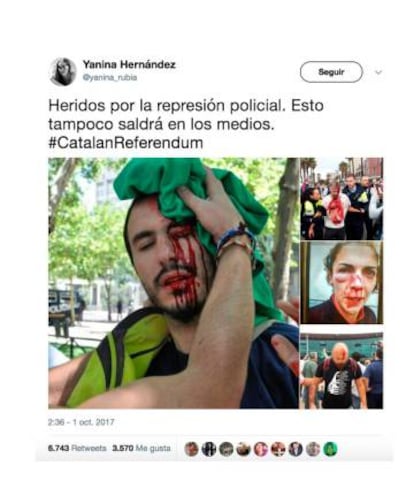
That position cannot stop the flagship newspaper in Spain from pointing out lies and inaccuracies. When pro-independence forces say that the police charges during the referendum ended up with 900 people injured, this newspaper has a duty to check that figure. When they claim the day saw the worst violence in Europe since the Second World War, we must reject that statement, because it isn¡¯t true. When they distribute old photos to denounce the current violence, we must report this fact. When they call on us to talk about political prisoners, we? cannot yield, because the facts do not back up that information.
It is true that in the current crisis that the Western model of democracy is going through the press is being subjected to a persecution by political forces of all stripes, whether they be populist, extremist or nationalist. These politicians are availing themselves of the new environment ¨C more plural and more fragmented ¨C of social networks. The media is facing the challenge of knowing how to operate in this new ecosystem in order to continue to do our job by resisting, no matter how strong they are, the pressures from political power, wherever they may come from.
English version by Simon Hunter.
Tu suscripci¨®n se est¨¢ usando en otro dispositivo
?Quieres a?adir otro usuario a tu suscripci¨®n?
Si contin¨²as leyendo en este dispositivo, no se podr¨¢ leer en el otro.
FlechaTu suscripci¨®n se est¨¢ usando en otro dispositivo y solo puedes acceder a EL PA?S desde un dispositivo a la vez.
Si quieres compartir tu cuenta, cambia tu suscripci¨®n a la modalidad Premium, as¨ª podr¨¢s a?adir otro usuario. Cada uno acceder¨¢ con su propia cuenta de email, lo que os permitir¨¢ personalizar vuestra experiencia en EL PA?S.
?Tienes una suscripci¨®n de empresa? Accede aqu¨ª para contratar m¨¢s cuentas.
En el caso de no saber qui¨¦n est¨¢ usando tu cuenta, te recomendamos cambiar tu contrase?a aqu¨ª.
Si decides continuar compartiendo tu cuenta, este mensaje se mostrar¨¢ en tu dispositivo y en el de la otra persona que est¨¢ usando tu cuenta de forma indefinida, afectando a tu experiencia de lectura. Puedes consultar aqu¨ª los t¨¦rminos y condiciones de la suscripci¨®n digital.


